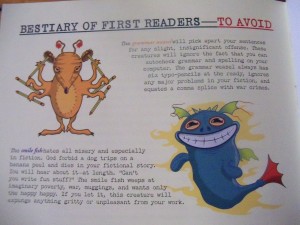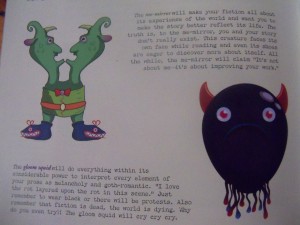You finish a piece of writing. It’s polished. It’s done. You feel the sense of completion in every atom of your being as a writer. Savor that moment. The end. Done. You save it. You print it. You revise it again. You read it aloud. It’s ready for reader feedback.
So who do you ask?
Not your lover or spouse. Not your best friend or your kids or your parents. Not even. It’s a no-win situation for them as beta-readers for your work. If they sing your praises, you suspect their independent judgement. If they offer a critique, it’s personal not professional. Don’t put them in this awkward spot.
You need beta-readers. You want someone to read your work and respond to its content.
Sure, it’s nice to get affirmations from friends and family when they read what you have written and are genuinely interested. It feels good. But you want and need your writing to BE good. So how will you know? Who can you trust?
Beta-readers are called that because of marketing lingo. They are beta-testing your product: a book manuscript. It’s a bit a misnomer. Really they are first-readers.
There are some types of beta-readers you want to avoid.
The Wonderbook: The Illustrated Guide to Creating Imaginative Fiction by Jeff Vandemeer offers so much wonderful advice to writers, it’s in my top list of resource books for writers. It’s not just about ficton, but writing as a profession The comical graphic illustrations of those beta-readers to avoid include the following:
 The grammar weasel “will pick apart your sentences for any slight, insignificant offense. These creatures will ignore the fact that you can autocheck grammar and spelling on our own computer. The grammar weasel always has six typo-pencils at the ready, ignores any major problems in your fiction, and equates a comma splice with war crimes.”
The grammar weasel “will pick apart your sentences for any slight, insignificant offense. These creatures will ignore the fact that you can autocheck grammar and spelling on our own computer. The grammar weasel always has six typo-pencils at the ready, ignores any major problems in your fiction, and equates a comma splice with war crimes.”
The smile fish “hates all misery… God forbid a dog trips on a banana peel and dies … You will hear about it – at length. ‘Can’t you write fun stuff?’ The smile fish weeps at imaginary poverty, war, muggings, and wants only the happy happy. If you let it, this creature will expunge anything gritty or unpleasant from your work.”
The me-mirror “will make your fiction all about its experience of the world and want you to make the story better reflect its life. The truth is, to the me-mirror, you and your story don’t really exist. This creature faces its own face while reading and even its shoes are eager to discover more about itself. All the while, the me-mirror will claim ‘It’s not about me – it’s about improving your work.”
The gloom squid “will do everything within its considerable power to interpret every element of your prose as melancholy and goth-romantic. ‘I love the rot layered upon the rot in this scene.’ Just remember to wear black or there will be protests. Also remember that fiction is dead, the world is dying. Why do you even try?? The gloom squid will cry cry cry.”
While I love this book, I don’t think it exhausted the topic. The Bestiary of First Readers appears on page 270 but there are other beta-readers whom you want to avoid.
“Book-tape-worm” reader can’t be trusted. No one reads everything without making judgements about what is good or bad. All their reviews are 5 star and in the end, well, let’s not go there. They love whatever their eyes fall upon. If they say they read “anything” then maybe their feedback won’t be all that useful. They may provide you with a long line of verbiage promoting your book without critical judgement. Some of these parasitic creatures are self-published authors. They suck off your good will in the hope you’ll be their beta-reader and more: a reviewer, fan, promoter, and member of their lonely hearts of mutual of admiration club.
Beware of “Genre Ogres.” Some beta-readers voraciously consume writing within a specific genre. These tend to be the volunteers for reading your work. Their attention to your manuscript can digress quickly into grumbles and complaints that yours fails to compare. It is important to know whether you meet reader’s expectations of the genre, however, ogres are monstrous beings with disproportionately large heads who eat babies.
Non-reader Omegas. They belong to the “great” audience that is potentially interested in your book and its subject matter. But they aren’t readers. Omegas are ranked lowest in the wolf pack of reviewers.They aren’t going to finish reading the book, but don’t take it personally. They don’t finish reading any book. They don’t have time. It’s not a priority. For lots of reasons that have nothing to do with you, but they were being nice at the time you asked.
You want someone to say that the end of Chapter 3 sucks or your protagonist isn’t a likeable character and that’s an inherent flaw.Who is going to tell you whether or not the clues in your mystery give away too much too soon? Being told your characters are two-dimensional and shallow: Ew, who wants that job?
Another writer. An editor. Someone whom you can entrust to see beyond your rough drafts who thinks you have a story worth sharing. Someone whose opinions on writing craft you respect.
When you ask a beta-reader for feedback, be specific about what kinds of feedback you want. Provide them with a list of questions: Does the end of chapter 7 work? Have I established enough character depth by the third scene for the motives to be clear? Have I built a world in words that my readers can see in their mind’s eye? Is there sufficient evidence to warrant my conclusion?
“What did you think?” “Do you like it?” These are not questions that solicit constructive criticism. They serve the ego, but not the writing.
Pick your beta-readers carefully and their feedback can transform your early drafts into a better book.
